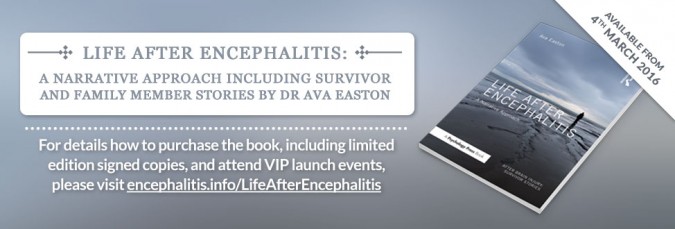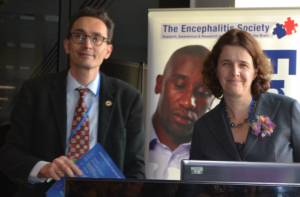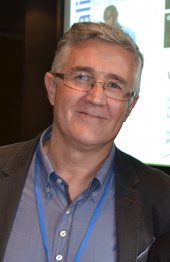
Being familiar with the Encephalitis Society’s work through word of mouth as well as their highly informative website, I was looking forward to attending this year’s Professional Seminar. I had high expectations for the afternoon and I am happy to report that the event far exceeded those expectations.
The stimulating talks were delivered by a multidisciplinary panel of international experts and topics ranged from cutting-edge research to moving patient testimonies. Equally diverse was the audience in attendance which included neurologists, psychiatrists, nurses, neuropsychologists, as well as patients and their families. This coming together of diverse perspectives greatly enhanced the depth and reach of the afternoon’s discussions and created a sense of community and shared purpose, often lacking at academic meetings.
The afternoon started with a very warm welcome from Dr Ava Easton, CEO of The Encephalitis Society and Professor Tom Solomon, Director, Institute of Infection & Global Health, University of Liverpool. Their brief introduction tracked the history of the society from its humble beginnings as a small group of like-minded individuals aiming to increase awareness about a neglected disease to its current standing as a major player in the field. The society celebrated its 21st year in 2015 and has now become a large multi-disciplinary network dedicated to improving the care of patients with encephalitis by supporting innovative clinical research and by continuing to educate the medical community and public at large about this often devastating disease, in addition to continuing to support patients and their families.

The first speaker was Dr. Belinda Lennox, Oxford University Hospitals NHS Trust , presenting “What do Psychiatrists have to offer in the management of Autoimmune Encephalitis.” Dr Lennox explained that although autoimmune encephalitis often presents with neuropsychiatric disturbances such as hallucinations, paranoia, movement disorders, autonomic dysfunction, and seizures, there may be a subpopulation of patients with acute psychosis as the sole manifestation of the disease. This is an important group to recognise, as their psychosis may respond to immunotherapy. Dr Lennox shared data from studies demonstrating NMDAR and VGKC antibodies in up to 6% of patients presenting with acute psychosis. Although this suggests a possible autoimmune basis, it is unclear whether the antibodies are clinically significant. In order to answer this question, Dr Lennox showed data from a small case series demonstrating good response to immunotherapy in antibody positive patients presenting with acute psychosis. A randomised control study comparing immunotherapy vs antipsychotics in this patient population is currently in the works. Finally, Dr. Lennox emphasised the need for neurologists and psychiatrists to work together to ensure that patients with neuropsychiatric symptoms are adequately assessed in order to rule out a possible autoimmune basis for their presentation.
Next, Dr Ruth Backman, University of Liverpool presented “Results of a cluster randomised controlled trial promoting early management of patients with suspected Encephalitis.” Dr Backman detailed the results of a study evaluating an intervention package designed to improve the management of patients with suspected encephalitis upon arrival to the hospital. The theoretically informed intervention package included a variety of educational materials and training sessions targeting health staff responsible for the initial evaluation and management of those with suspected encephalitis. Twenty-four UK hospitals participated in the study which ran for 12 months. A composite primary outcome measure consisted of initiation of Aciclovir within 6 hours and performing a lumbar puncture within 12 hours of admission. The results of the preliminary analyses were discussed and will be the subject of a full publication.
Dr Julia Granerod discussed two recent epidemiological studies carried out at Public Health England. The first study aimed to assess the role of neuroimaging in the early management of encephalitis and the agreement on scan interpretation in a well-defined series of suspected encephalitis cases. The second study aimed to quantify increased risks of specific outcomes among encephalitis cases, including epilepsy, psychiatric sequelae, cognitive problems, headache, and alcohol abuse, compared to the general population. Results from these two studies will soon be published.
Next, Dr Cristina Fernandez, University of Liverpool, discussed ‘DexEnceph’, a long-awaited randomised control trial evaluating the role of corticosteroids in the management of HSV encephalitis. Dr Fernandez pointed out that despite adequate anti-viral treatment, HSV encephalitis is still associated with significant mortality and morbidity. She explained that brain inflammation occurring secondary to the viral infection could be an important contributing factor to poor outcomes. There is retrospective data suggesting that corticosteroids reduce brain swelling and improve outcomes in HSV encephalitis. DexEnceph will recruit 90 adults across the UK over 4 years. Half will receive dexamethasone along with standard treatment and half will receive standard treatment only. All participants will be followed for 18 months with the aim of determining whether corticosteroids improve memory and functional outcomes.
Just before the break, Dr Mildred Iro, Oxford University, provided detail on IgNITE, a phase III randomised placebo controlled study aiming to assess the role of intravenous immunoglobulin (IVIg) in the management of children with encephalitis. Dr Iro explained that past studies have suggested a role for IVIg in encephalitis irrespective of whether it is autoimmune or viral in aetiology. However, no randomised control trial has ever been conducted to assess its efficacy. IgNITE will look to recruit 308 children and randomise them to receive either IVIg or placebo, in addition to standard therapy. All subjects will be followed for 12 months and outcomes assessed using standardised scales, imaging, and inflammatory markers.

The first talk following the break was given by Dr Domingo Escudero, Hospital Germans Trias i Pujol, Barcelona, Spain, who delivered a lucid and moving account of his struggles with NMDAR encephalitis. A neurologist himself, Dr Escudero first developed symptoms in 2006 before NMDAR encephalitis was described and was misdiagnosed with atypical schizophrenia. He vividly portrayed the fear and sense of loss he felt as his thinking became increasingly disordered and he became dependent on others for the most mundane of tasks. Without appropriate treatment, recovery was painstakingly slow and he doubted that he would ever return to work. He eventually did recover only to relapse in 2011. This time however, he was appropriately evaluated and diagnosed with NMDAR encephalitis. Recovery was hastened with immunosuppression but he did relapse again in 2014 requiring escalation in treatment. Despite these setbacks Dr Escudero is back at work and has become active in the larger encephalitis community sharing his story in both medical and lay platforms. Dr Escudero ended his talk by highlighting the crucial role played by organisations such as The Encephalitis Society, in providing accurate and up to date information to the public, particularly as patients and their families turn to the internet to gain knowledge about health and disease.
In the last scheduled talk of the afternoon, Janet Hodgson, Consultant Clinical Neuropsychologist, shared the experience of The Encephalitis Society Neuropsychology Service (ESNS). The ESNS provides neuropsychological support for adults through a variety of delivery modes including face–to-face, telephone, and videoconferencing. She explained that unlike patients with traumatic brain injury, patients with encephalitis are usually discharged home without rehabilitative follow-up, in part due to the absence of visible disability. Once in the community, patients can struggle gaining access to neurorehabilitative care in a timely manner. The ESNS was created to fill this need. Between April and September of 2015, a total of 26 patients were referred to the ESNS and outcomes were positive based on self-report as well as a battery of standardised measures. Ms. Hodgson finished by describing future marketing efforts aimed at increasing referral to this unique, and much needed service.
As part of her concluding remarks, Ava Easton, CEO, spoke proudly of the many achievements of The Society and the events commemorating its 21st birthday, including the publishing of new guidelines for professionals as well as new educational materials for iBook, the growing reach of World Encephalitis Day, and the unprecedented success of a Road Show, which covered 21 cities in the UK in 21 days, and disseminated the society’s message via the hashtag “#ShowYouKnow”.
The seminar concluded with the announcement of a new Award to be launched in 2016 by The Encephalitis Society: “Outstanding Achievement Award for Excellence in Encephalitis Healthcare”. Professionals will be able to make nominations for the award from Spring 2016.
Finally the prizes were awarded to the winner and runner-up of The Society’s Medical Student Essay Prize: Roshni Bhudia (Winner) for the essay: Diagnosis of NMDA Receptor Autoantibody Encephalitis, and Mitchell Burden (Runner-Up) for the essay: Current public awareness of encephalitis and its importance in improving health outcomes.
A wine and cheese reception, allowing opportunity for networking, followed the talks.
For free professional membership of The Encephalitis Society and to be kept up to date with research and future conferences, please visit www.encephalitis.info
ACNR 2015;16(2):28-29. Published online 14/6/16
To cite: Todedano M, Easton A. ACNR 2016; 16 (1)